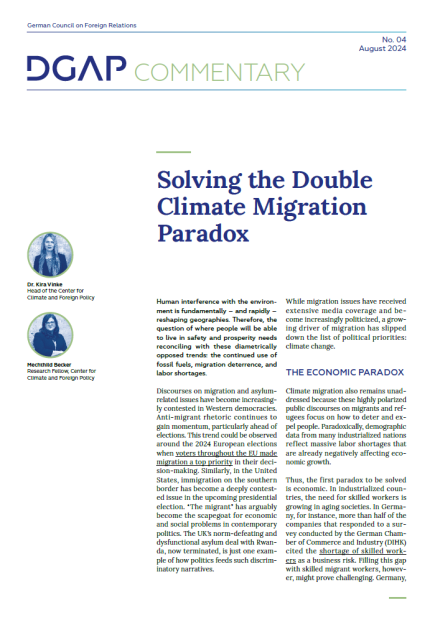Discourses on migration and asylum-related issues have become increasingly contested in Western democracies. Anti-migrant rhetoric continues to gain momentum, particularly ahead of elections. This trend could be observed around the 2024 European elections when voters throughout the EU made migration a top priority in their decision-making. Similarly, in the United States, immigration on the southern border has become a deeply contested issue in the upcoming presidential election. “The migrant” has arguably become the scapegoat for economic and social problems in contemporary politics. The UK’s norm-defeating and dysfunctional asylum deal with Rwanda, now terminated, is just one example of how politics feeds such discriminatory narratives.
While migration issues have received extensive media coverage and become increasingly politicized, a growing driver of migration has slipped down the list of political priorities: climate change.
The Economic Paradox
Climate migration also remains unaddressed because these highly polarized public discourses on migrants and refugees focus on how to deter and expel people. Paradoxically, demographic data from many industrialized nations reflect massive labor shortages that are already negatively affecting economic growth.
Thus, the first paradox to be solved is economic. In industrialized countries, the need for skilled workers is growing in aging societies. In Germany, for instance, more than half of the companies that responded to a survey conducted by the German Chamber of Commerce and Industry (DIHK) cited the shortage of skilled workers as a business risk. Filling this gap with skilled migrant workers, however, might prove challenging. Germany, it seems, is not very appealing to this demographic. It ranks only fifteenth in the OECD’s Indicators of Talent Attractiveness. Recently, DIHK President Peter Adrian called for a “welcoming culture” to attract skilled workers from foreign countries and also spoke of deficits in issuing work visas and providing housing and childcare. Germany must find ways to attract and retain more foreign talent to keep its economy running.
Monika Schnitzer, one of the German government’s top economic advisors, has suggested that 1.5 million labor migrants are needed annually to meet the country’s net migration need of 400,000 people. This issue is not unique to Germany. At the end of 2023, Belgium had the highest job vacancy rate among all EU member states at 4.7 percent, followed by the Netherlands, Austria, and Germany. According to a working paper of the OECD, Australia, Canada, and the United States have seen particularly high post-pandemic labor shortages across industries among its member countries.
The Moral Paradox
The second paradox to be solved is moral. Over the past decades, governments and societies have chosen to continue using fossil fuels in full awareness of the losses and damages that could occur as a result of this dangerous interference with the climate system. The potential consequences of climate impacts, including migration and displacement, have been repeatedly outlined by experts, most comprehensively in the assessment reports of the Intergovernmental Panel on Climate Change (IPCC). Paradoxically, the losses and damages that are now occurring are largely expected to be shouldered by the poorest in developing countries, populations who have not benefited from fossil-industrialization but are at the forefront of climate change. Faced with severe and harmful climate impacts, they might have no choice but to move out of harm’s way.
Given current dynamics, finding solutions that help people stay in place or that enable safe and orderly internal and transboundary migration pathways has become a matter of political necessity. Recent extreme weather events, such as the floods in Rio Grande do Sul, Brazil, that displaced 600,000 people, are a case in point. In its latest global report, the Internal Displacement Monitoring Centre documented more than 20 million weather-related internal displacements in 2023. Highly developed countries also face significant challenges – Germany, for example, has seen extensive flooding in its West (Ahrtal), South (Bavaria), and North (Lower Saxony) within three years. Globally rising numbers of displacements from both conflict and environmentally-driven violence reflect extensive uprooting that affects both developing and industrialized countries – albeit differently.
Toward a Comprehensive Policy Approach
As geographies are fundamentally and rapidly reshaped by human interference with the environment, it is essential to reconcile where people will be able to live in safety and prosperity with the three diametrically opposed trends of the continued use of fossil fuels, violent migration deterrence, and labor shortages. A shift from change avoidance to the active management of transformation processes, including demographic transitions, is needed. This is no easy task as matching arriving migrants with the needs of labor markets can be difficult. However, current budget cuts for language courses in Germany for new arrivals and for academic and cultural exchange point in the wrong direction.
Effective policies will require a 360-degree assessment that considers factors such as education, training, language skills, economics, housing, place attachment, and culture. Solutions must not only be based on technicalities and effectiveness but also need to take justice dimensions and the maintenance of social cohesion into account. Policy design that is rooted in human rights and enables economic integration will bring governments closer to resolving both of these wicked climate migration paradoxes.


